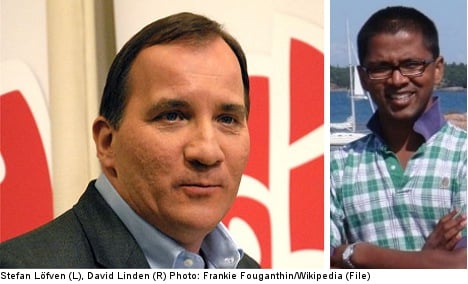By all accounts Stefan Löfven has been a successful leader of the Swedish Social Democrats.
When he took over, the party was deeply divided and it had lost two elections in a row. The last leader, Håkan Juholt, did not even serve a full term.
When Juholt had most of his problems, he boasted to the press that he had received a text message from “an English colleague”.
It was a message of support: “Håkan my friend, remember that heat tempers steel. And you will be the next prime minister of Sweden” (Fokus, January 20th, 2012).
But Ed Miliband was wrong and Juholt never got to be prime minister of Sweden as he was forced to resign in January amid continued questions about his leadership.
So, what about Stefan Löfven?
As former chairman of the IF Metall union, he surely knows how to temper steel.
A string of recent polls show more than one third of voters support the Social Democrats, with results indicating the current centre-left opposition would have a majority in parliament.
So today, Löfven would be prime minister. But will he be able to convince the Swedish electorate in the next general election in 2014?
That question can only be answered on Election Day, of course.
What can be said, however, is that the party has “managed to talk politics and not about other things”, according to Social Democrat party secretary Carin Jämtin (Expressen, April 6th, 2012).
And Stefan Löfven’s personal popularity is similar to the ratings previous Social Democrat prime minister Göran Persson received at the height of his popularity.
It seems, therefore, like Stefan Löfven is invincible and that a change of Swedish government is inevitable.
Furthermore, an election today would mean that the Centre Party and the Christian Democrats, both members of the current centre-right Alliance coalition, would lose their representation in parliament.
So what is Löfven’s recipe for political success?
The answer is that he has not got a recipe and that it is far from sure that he will succeed.
He has only retreated back to the Social Democrat comfort zone when it comes to ideas. When Löfven was appointed interim leader, he succeeded two individuals that had attempted to change the party.
Mona Sahlin wanted to move the party to the right and Håkan Juholt wanted to move it to the left. But Stefan Löfven wants to remain in the middle.
The focus was on employment and if anything was said in public, it was something everyone agreed with such as “it is wrong to cut down on university places”.
Niklas Nordström, former chair of the party’s youth organization SSU has compared the Social Democrats to the Republican Party in the United States.
Sweden is a nation left of the centre and the US is right of the centre. For a long time a party that was centre-right dominated US politics and a party that was centre-left dominated Swedish politics.
But when Clinton launched the New Democrats and the Moderates launched the Alliance for Sweden, the GOP and Social Democrat establishment both failed to change. Instead, each continued along outdated paths and, for some time, it generated support in the polls.
Stefan Löfven is a successful tactician.
He is silent and he allows the government to make its own mistakes.
In many ways, he is a Swedish James Callaghan, Margaret Thatcher’s predecessor, who was seen as very successful until he was destroyed by a series of industrial strikes started by the radical Left in the Labour Party.
When he is forced to speak, Löfven might face a similar fate.
The Social Democratic left forced Mona Sahlin into an electoral cooperation with the former Communist Party, the Left Party.
The party’s left wing then thought Håkan Juholt was “their candidate”.
Löfven, who has so far been successful by being silent, will have to either please or disappoint the left wing of the party.
If he pleases them he will lose support among the voters and if he disappoints them, he will lose control of the party.
With his current stellar poll ratings, however, he can only disappoint when he finally starts to speak.
David Linden is a PhD student in history at King’s College London and a former resident of Malmö. Follow him on Twitter at @davidlinden1.



 Please whitelist us to continue reading.
Please whitelist us to continue reading.
Member comments